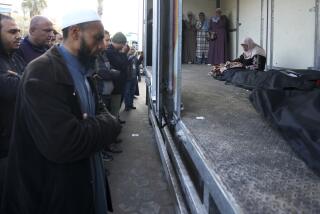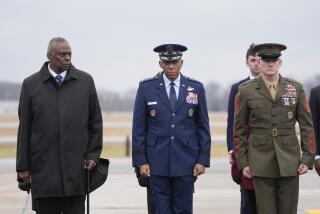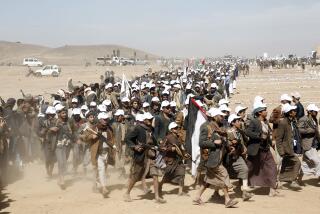Fears of Iraqi Warfare Grow as 6 Britons Die
- Share via
BAGHDAD — Opponents of the U.S.-led occupation killed six British soldiers in southern Iraq on Tuesday and are suspected of sabotaging power and water in what increasingly looks like a guerrilla campaign.
It was one of the deadliest days since the principal fighting was declared over on May 1. U.S. officials estimated that there had been 25 armed attacks in the preceding 24 hours -- an increase from the average of 16 attacks a day in the last week.
In the Iraqi capital, residents sweltered in the more than 110-degree heat, going without electricity and water after a gas pipeline exploded.
The rupture paralyzed the four main power plants that run the grid for central Iraq, which includes Baghdad, according to sources at the United Nations and the International Committee for the Red Cross.
“These are more than just pinpricks, being able to knock out power for a number of days,” said oil analyst Raad Alkadiri at PFC Energy, a Washington-based consulting firm.
“Coming on top of the absence of law and order, the general frustration with being occupied and the economic uncertainties, you have a mood as you go into the very hot part of the summer that could turn ugly.”
Using guns and grenades, insurgents staged the first lethal postwar attack in southern Iraq, an ambush of British troops that left six dead near the city of Amarah, about four hours southeast of the capital.
In the past, the British seemed to have been accepted by Iraqis and had often felt safe enough to patrol without helmets and flak jackets.
In a second incident in the same area, eight British troops were wounded in a shootout with Iraqi gunmen.
Outside Baghdad, three Iraqis were killed in a firefight with U.S. soldiers. No American casualties were reported.
U.S. officials said it was unknown if the assailants were working together.
“I think it’s undetermined at this point how coordinated these efforts are,” Air Force Gen. Richard B. Myers, chairman of the Joint Chiefs of Staff, told reporters at the Pentagon.
“We know that there are Baath Party members that don’t want this country to go to a democratic form of government.... They prefer to return to the old ways. And so, they are still out there. There are other paramilitaries, probably, that have joined them.”
At the Pentagon briefing, Defense Secretary Donald H. Rumsfeld said troops were making progress.
“Just as they were unable to stop the coalition advance in Baghdad, the death squads will not stop our commitment to create stability and security in postwar Iraq,” Rumsfeld said.
But some analysts worried that Tuesday’s attacks might be part of a plan to oust the Americans and British.
“There are some intelligence sources that indicate that Saddam’s regime planned for this kind of phase in the war,” said Anthony H. Cordesman, a former senior Pentagon official with expertise in Iraq. Cordesman is now an analyst with the Center for Strategic and International Studies, a public policy group in Washington.
“Certainly what we’re watching is an accelerating process in which the threat being posed seems to be better structured and better organized.... I don’t as yet see we have a clear pattern, but it certainly is disturbing.”
In London, Defense Minister Geoff Hoon told Parliament that the bodies of six military policemen had been recovered in the village of Majar Kabir, 16 miles south of Amarah. They went there to train Iraqi police officers and were attacked, apparently in the stationhouse.
A few hours earlier in the same town, two vehicles carrying troops from the 1st Battalion, the Parachute Regiment, came under fire from a large number of Iraqi gunmen using rocket-propelled grenades and machine guns.
A quick reaction force including Scimitar armored vehicles and a Chinook helicopter came to the aid of the patrol, but they too came under heavy fire.
Seven men in the helicopter and one trooper on the ground were injured, Hoon said. The wounded were taken to a field hospital, and two were transferred to a U.S. field hospital in Kuwait for treatment of serious injuries.
“Coalition forces have worked hard to secure Iraq in the aftermath of decisive combat operations,” Hoon said. “They will not be deflected from their efforts by the enemies of peace.”
British politicians from all sides generally expressed solidarity with the forces, but some asked for further support for troops.
Praising the British army’s work in Iraq, Bernard Jenkin, defense spokesman for the opposition Tory Party, told reporters, “If we require more troops in Iraq to operate safely, then the government must send more troops.”
Others from the Labor benches questioned whether the U.N. should now be brought in to back up the coalition forces.
“Whether we like it or not, the British forces, like the Americans, are seen to be less of a liberating force and more of an occupying army. Under these circumstances, shouldn’t we make an urgent approach to the United Nations?” asked Labor lawmaker Tam Dalyell, who had opposed the invasion of Iraq.
Tuesday’s deaths were the first suffered by British troops since May 1. They suggest troubling scenarios for the occupying forces.
One possibility is that the local population is turning against even the British, who have so far avoided the kind of hit-and-run violence that has beset the Americans elsewhere in the country.
Another possibility is that fundamentalists among Shiite Muslims, who are centered in the south, may be stepping up their efforts to displace the troops.
The attacks Tuesday on American soldiers claimed no fatalities. They occurred in the so-called Sunni Triangle, the area of central Iraq that was a stronghold of former President Saddam Hussein and where low-level guerrilla activities have been going on for several weeks.
Three Iraqis were killed and two wounded in Ramadi when American troops returned fire. It was unclear whether those killed were the attackers or civilians.
In addition to the growing number of attacks on troops, there were fears that sabotage was on the rise.
Central Iraq reeled from the impact of two gas pipeline explosions that immobilized electrical power and water systems. The apparent targeting of oil and gas pipelines raised questions about efforts to revive Iraq’s economy.
Experts said pipelines are not that difficult to repair, assuming that crews have access to the right equipment and material. But with the temperature in Baghdad reaching 120 degrees on some days, every hour without electricity has the potential to undermine public support for the United States and its allies.
Although electricity has been erratic in Baghdad over the last month, it has gradually improved. But with three successive explosions over the last two weeks, whatever power there was vanished.
By nightfall Tuesday, Baghdad was dark much as it was in the days immediately after the war.
In wealthier neighborhoods, a few windows glowed thanks to generators. But most homemakers were cleaning out their refrigerators or hurrying to purchase blocks of ice, whose price more than doubled during the day as it became clear that there would be no other way to keep milk or meat cold.
A desperate mood gripped the city’s poorer communities, where large families cram into one or two rooms and rely on a fan to bring a breath of air.
In Thawra, the poor neighborhood where many of the city’s Shiite Muslims live, there were near riots when the young boys who ran the makeshift ice shacks -- small wooden structures used to hold blocks of ice -- raised the price of the ice blocks to 5,000 dinars, equivalent to a few cents, but too much for many families here who are jobless and have many mouths to feed.
A horde of small children rushed toward several American military vehicles driving through the streets, shouting, “Water! Water! Water!” When it became clear that the convoy would not stop, they began throwing small rocks.
Women in the neighborhood came up to strangers and complained that with not even a fan to move the hot air, they could not sleep and that it was worse for their children. But generators have become too expensive for lower income people because merchants have more than doubled their prices in the face of demand.
*
Rubin reported from Baghdad and Hendren from Washington. Times staff writers Janet Stobart in London and Warren Vieth in Washington contributed to this report.
More to Read
Sign up for Essential California
The most important California stories and recommendations in your inbox every morning.
You may occasionally receive promotional content from the Los Angeles Times.













